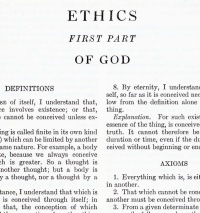Ethics (Spinoza book)
From The Art and Popular Culture Encyclopedia
| Revision as of 15:27, 9 December 2014 Jahsonic (Talk | contribs) ← Previous diff |
Revision as of 19:56, 23 February 2015 Jahsonic (Talk | contribs) (→See also) Next diff → |
||
| Line 15: | Line 15: | ||
| *[[Amor est titillatio, concomitante idea causæ externæ]] | *[[Amor est titillatio, concomitante idea causæ externæ]] | ||
| *[[Ethics]] | *[[Ethics]] | ||
| + | * ''[[Natura naturans]]'' | ||
| + | * ''[[Natura naturata]]'' | ||
| + | * [[Nature connectedness]] | ||
| + | * ''[[Opera Posthuma]]'' | ||
| + | * [[Pantheism]] | ||
| + | * [[Philosophy of Spinoza]] | ||
| {{GFDL}} | {{GFDL}} | ||
Revision as of 19:56, 23 February 2015

|
Related e |
|
Featured: |
Ethics is a philosophical book written by Baruch Spinoza. It was written in Latin. Although it was published posthumously in 1677, it is his most famous work, and is considered his magnum opus.
In Ethics, Spinoza attempts to demonstrate a "fully cohesive philosophical system that strives to provide a coherent picture of reality and to comprehend the meaning of an ethical life. Following a logical step-by-step format, it defines in turn the nature of God, the mind, human bondage to the emotions, and the power of understanding -- moving from a consideration of the eternal, to speculate upon humanity's place in the natural order, freedom, and the path to attainable happiness."
Style
The style is, as Spinoza says, "demonstrated in geometrical order" with prefaces, definitions, axioms, and lemmas. These are followed by propositions that can contain notes, proofs, and corollaries. Appendices that contain explanations are also employed. This type of presentation imitates Euclid's Elements of Geometry.
God or Nature
Spinoza wrote the words "God or Nature" [Deus sive Natura] twice. The first instance was in the Preface to Part IV, fourth paragraph. The second was in the Proof of Part IV, Proposition IV. In so doing, he made it possible to interpret his work as "a complete view of the universe as a whole, and of man's place in the universe…." to Henry Oldenburg, he maintained that he did not mean to equate God with mere material nature. In this sense, Einstein said, "I believe in Spinoza's God who reveals himself in the orderly harmony of what exists, not in a God who concerns himself with fates and actions of human beings.”
See also
- Amor est titillatio, concomitante idea causæ externæ
- Ethics
- Natura naturans
- Natura naturata
- Nature connectedness
- Opera Posthuma
- Pantheism
- Philosophy of Spinoza

